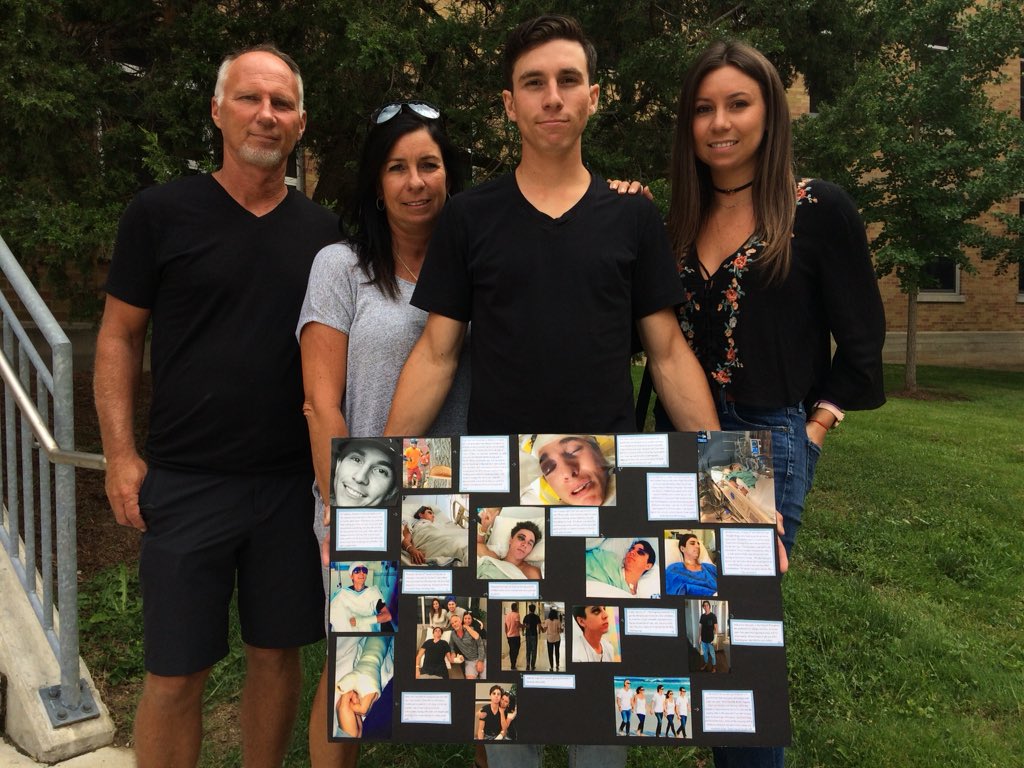Thirty-seven people were taken to London hospitals during last year’s “fake homecoming” celebrations near Western University.

Cole Liley was among them. The 22-year-old arborist had climbed up to a second-floor balcony, and was on his way down when the wooden railing he was hanging onto broke. He fell on his head and neck, and suffered a brain injury, as well as multiple fractures to his back, skull, face, and hand.
“It took an hour for the ambulance to get to me, and an hour and a half for the ambulance just to get back to the hospital,” he said.
That’s just what he’s heard from friends and family, though. Cole was conscious, but says he doesn’t remember anything until four days later, when he woke up from a medically induced coma.

“He was basically just screaming for help,” remembers his sister, Madison. She was the first family member to get to him in hospital, and said she felt hopeless as her brother asked her over and over again for help, saying he didn’t feel good and wanted to go home.

Get weekly health news
“He doesn’t remember it obviously, because his brain was bleeding at the time.”
Candace and Jeff Liley, Cole’s parents, remember being ushered into a quiet room and being told that Cole was put on a ventilator and in a medically induced coma.
“A couple hours later, … the trauma doctor came out, and asked us who was able to make decisions if we had to make any decisions tonight about Cole’s life,” explained Candace, her voice trembling.
“Our hearts sunk,” she said.
It was a tough three days for the Liley family, before doctors said they were ready to see if Cole could breathe without the ventilator. He managed to breathe on his own, and was discharged from the hospital after a week.
“The recovery was a long time,” Cole said.
“When I came home, I had a lot of days where I had to lay in bed and not move, and I had to go back to the hospital because I was still hurting so bad.”
- Something’s fishy: 1 in 5 seafood products are mislabelled, study finds
- After controversial directive, Quebec now says anglophones have right to English health services
- Why non-alcoholic beer is gaining steam at Oktoberfest: ‘Nobody will judge you’
- Recall expands for Nutrabolics vegan bars over undeclared milk
Cole had a surgical procedure to prevent blood clots caused by heavy bruising on his body. He went back to the hospital three times, plus another visit to get a cast taken off.
He said it took two or three months before he felt “100 per cent.”
It’s been nearly a year since the incident. Cole is sharing his story now, in hopes of making others think twice about reckless decisions they might make while partying.
“My decision making has changed,” he said.
“People are going to go out and have fun, and drink and that, but also just something can happen, even when you’re not partying. It could happen in a split second. It could affect you, and your family and your friends.”
That’s a message that London Health Science Centre’s injury prevention specialist Jane Edwards can get behind.
“I think Cole is very lucky,” she explained.
“The way he fell, and his recovery — it’s very surprising to see somebody who falls that span, and landing on his head and back, and seeing him today walking and living his life, is a wonderful thing.”
As part of the LHSC’s trauma program, Edwards is all too familiar with most stories of traumatic injury, which usually include long hospital stays, multiple surgeries, and “missing huge chunks, months of your life.”
Summer is considered trauma season for hospitals and emergency health care workers, but Edwards says the season has been expanding.
“In the last number of years, September and October, September specifically, we have seen a rise in younger people coming in with severe and traumatic injuries. It’s still part of our trauma season.”
That’s why Edwards and the LHSC are reminding young people, especially those living on their own for the first time for post-secondary school, not to cross the “stupid line.”
“There are lots of things that can blur that line, and that’s what we want people to think about. Obviously, alcohol and drugs can affect our decision making, so having that plan in place prior to getting drunk is something I highly recommend,” Edwards said.
“Have fun, be safe, think, and take care of one another.”












Comments